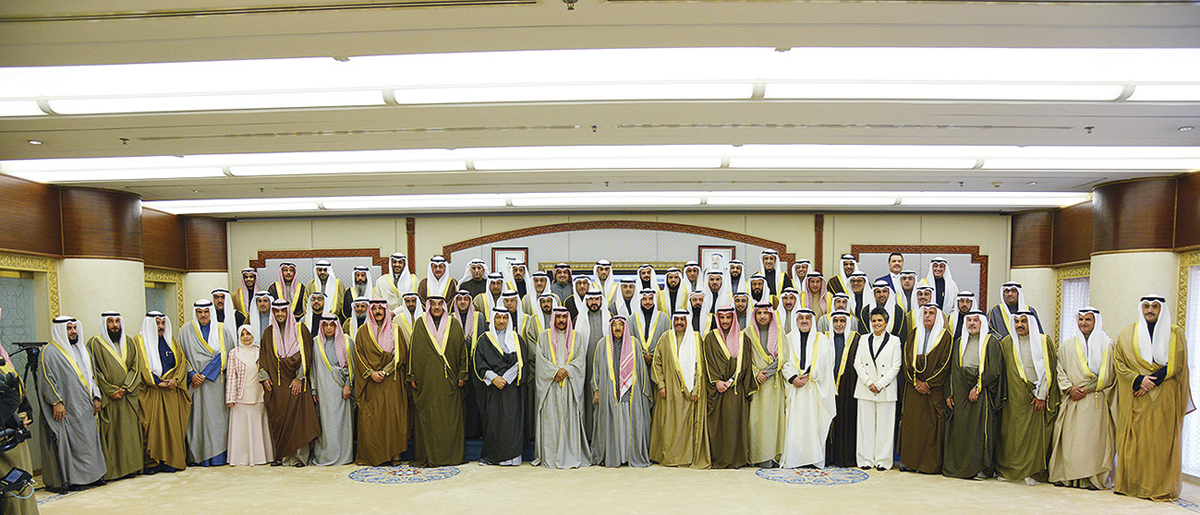Ghanem reelected speaker, Kandari deputy - Opposition shut out
 KUWAIT: HH the Amir Sheikh Sabah Al-Ahmad Al-Jaber Al-Sabah and HH the Crown Prince Sheikh Nawaf Al-Ahmad Al-Jaber Al-Sabah pose for a group photo with members of the new National Assembly yesterday. — Amiri Diwan
KUWAIT: HH the Amir Sheikh Sabah Al-Ahmad Al-Jaber Al-Sabah and HH the Crown Prince Sheikh Nawaf Al-Ahmad Al-Jaber Al-Sabah pose for a group photo with members of the new National Assembly yesterday. — Amiri DiwanKUWAIT: HH the Amir Sheikh Sabah Al-Ahmad Al-Jaber Al-Sabah told the new National Assembly's inaugural session that cuts in public spending are "inevitable" and require sacrifices to face the sharp slide in oil revenues. Meanwhile, former pro-government speaker Marzouq Al-Ghanem was reelected in a stunning fashion by securing 48 votes against a combined 17 votes for his two opposition competitors - MPs Abdullah Al-Roumi and Shuaib Al-Muwaizri.
Surprisingly, Ghanem obtained more votes in this Assembly with a strong opposition presence compared to the 38 votes he obtained in the previous Assembly, which was described as a rubberstamp of the government. The government also scored another win when Essa Al-Kandari was elected deputy speaker, defeating his opposition rival, Islamist MP Jamaan Al-Harbash, by a single vote. All the three losing opposition MPs strongly lashed out at the government for siding with their opponents.
In his speech, the Amir said that the sharp fall in oil revenues has created a huge deficit in the state budget and that there is no other option but to take effective measures to rectify the shortfall. "I am confident that the Assembly and all citizens are aware that cutting public spending has become inevitable through well-studied measures," the Amir said.
A majority of the lawmakers who won in the Nov 26 election have vowed to reject any government austerity measures that could impose new financial burdens on Kuwaiti citizens. The previous Assembly was dissolved over a dispute between the government and the Assembly for raising petrol prices. As a result, the Assembly was dissolved and snap elections were called.
The Amir said the measures must be accompanied by steps to stop squandering of public funds and exhausting national resources and direct them towards the right places. He however called for sparing low-income people from financial measures and for taking social justice into account. The Amir said he would not have liked to ask Kuwaitis to surrender something they have always enjoyed, but he added that he is confident that Kuwaitis, like their ancestors, are ready to sacrifice. Sheikh Sabah also warned against the growing dangers and terrorism around Kuwait and urged caution. The Amir also recalled that national unity can safeguard Kuwait against dangers.
After his impressive victory, Ghanem extended a hand of cooperation to all sides in the Assembly. But Roumi strongly lashed out at the government, while Muwaizri urged the speaker to forget the practices of the previous Assembly. After the result, social media was full of sarcastic comments about the new opposition group, as 27 MPs had met and decided to vote against Ghanem, but only a few did so.
Online activists said they were severely disappointed by the turn of events and how some lawmakers won on the pledge of voting against Ghanem, but then failed to fulfill their promises. The result also cast a thick cloud of doubt over how cohesive the opposition MPs are and whether they will remain united on all issues.
In the election of deputy speaker, MP Saadoun Hammad first said he wanted to contest against Harbash and the eventual winner Kandari. But Hammad later withdrew and alleged that there was a secret deal between the government and the Islamic Constitutional Movement (ICM) to elect Harbash, who strongly denied the allegation. In the first voting, Harbash received 32 votes against Kandari's 31, and because no one secured an absolute majority of votes, which is 33, the voting was repeated, and this time the result was reversed and Kandari was declared the winner. In the second round of voting, the winner needed only a simple majority to win, according to the Assembly's internal charter.
Almost the same thing happened in electing the secretary. MPs Safa Al-Hashem, the only female in the house, Waleed Al-Tabtabaei and Oudah Al-Oudah contested for the post. No one secured an absolute majority in the first round, and in the second, Oudah came first and won. Hashem then blasted the government for not siding with her to elect the first Kuwaiti woman as part of the three persons who sit on the Assembly's podium, which would have been a highly positive point for Kuwait internationally. However, the opposition won the last position available, which is the observer of the house. Islamist MP Nayef Al-Merdas won the post after two other contenders withdrew from the race.
Meanwhile, 10 MPs submitted two separate amendments to the nationality law, which call for preventing revoking citizenships without a final court ruling. The amendments also ban the government from deporting any person after revoking his citizenship without a final court ruling. The Assembly then elected members of its committees.
By B Izzak










